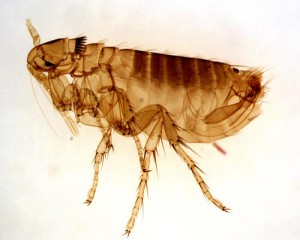
 Fleas: There are more than 1900 flea species worldwide but only 1 species is of concern in companion animal medicine. Ctenocephalides Felis, the cat flea, is the most common flea found on our cats and dogs. Successful control of a flea problem requires understanding the flea life cycle.
Fleas: There are more than 1900 flea species worldwide but only 1 species is of concern in companion animal medicine. Ctenocephalides Felis, the cat flea, is the most common flea found on our cats and dogs. Successful control of a flea problem requires understanding the flea life cycle.
1) The Egg: At any given time, about 1/3 of the flea population in your home is in the egg stage. These eggs are laid on our pets and then fall off to hatch in the house. Hatching occurs when conditions are ideal – high humidity and temperatures between 18-26 C.
2) Larva: Eggs hatch to release the larva, a caterpillar like creature which crawls around the environment eating “flea dirt” that has fallen off our pets. The larval stage makes up about 57% of the flea population in our house. The larvae are found near areas that animals frequent and in areas of relatively low traffic such as under couches. The larva is capable of spinning a cocoon and pupating.
3) Pupae: Once the larva has spun a cocoon, they are nearly invincible. Inside the cocoon, the pupa is turning into a flea. This stage can last for several months, even up to a year, waiting for the right time to emerge.
4) Unfed Adult Flea: The adult flea will emerge from its pupa when it senses the conditions are favourable. It can detect vibrations of an approaching host, carbon dioxide gradients as well as sound and light patterns. The newly emerged flea is hungry and eager to find a host however, an unfed flea may live for months in the environment without a blood meal.
5) Fed Flea: Fleas need to ingest blood to continue their life cycle and they target your pets as their source of food. The female flea will begin to produce eggs within 24-48 hours after her first blood meal and will lay eggs continually until she dies. If separated from its host the flea will die in a few weeks without a blood meal.
Average lifespan of adult flea is 4-6 weeks and on the average, it can take about 3 weeks from egg to adult.
The Good News: There are many flea control products available for all situations from a licensed veterinary hospital. The staff at Scholl Animal hospital would be pleased to answer all your questions regarding choosing the right product for your cat and dog. Further information regarding flea products at Veterinary Partner: 1) Fleas know your enemy 2) Flea product comparison
